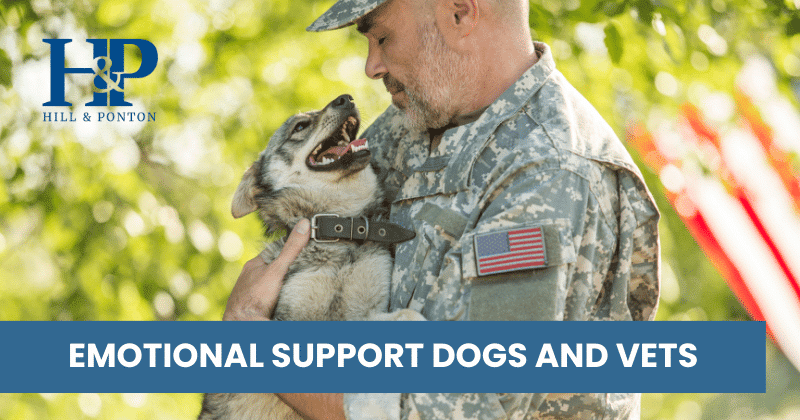While there are a variety of animals that can be trained to perform tasks that aid the day-to-day life of individuals with disabilities, by far the most common service animals are dogs. Dogs can learn to assist in a variety of ways and their work can really improve the quality of life of those who need them.
The use of emotional support animals and therapy animals has risen dramatically over the years, and it has provided an important benefit to many veterans. There is a wide variety of anecdotal evidence and scientific studies that show animal companionship has a strong correlation with improvements in physical and mental well-being.
What is the difference between service dogs, therapy dogs and emotional support dogs?
Service Dogs
Service dogs are prescribed for a disabled veteran under 38 CFR 17.148 for the purposes of the veteran being diagnosed as having a visual, hearing or substantial mobility impairment.
- Are covered by the Americans with Disabilities Act (ADA) and afforded rights to enter public establishments.
- Are trained to assist a single person
- May live with owners regardless of pet policies under the Fair Housing Act and Section 504 of the Rehabilitation Act of 1973.
- May fly with their disabled owner in the cabin of an aircraft, as part of the federal Air Carrier Access Act.
Therapy Dogs
- Provide emotional support or comfort to a number of different people in various settings (e.g. visiting hospital patients, comforting witnesses during court testimony, offering support to trauma survivors – like those with PTSD).
- Are not considered a service animal under the law and are not covered by or afforded rights through the ADA.
Emotional Support Dogs
- Provide emotional support through companionship.
- May live with owners regardless of pet policies under the Fair Housing Act and Section 504 of the Rehabilitation Act of 1973.
- Are not considered a service animal under the law and is not covered by or afforded rights through the ADA.
What are the types of service dogs?
There are a variety of different types of service dogs and some even serve multiple purposes. Unlike emotional support dogs, service dogs go through rigorous training programs to prepare them to work with their handlers. Some of the types of service dogs include:
- Guide dogs for the blind
- Hearing dogs for the deaf or hearing impaired
- Mobility assistance dogs for those in wheelchairs or with mobility limitations
- Seizure response dogs
- Diabetes assistance dogs to detect blood sugar fluctuations (scent-trained)
- Mental health service dogs/psychiatric service dogs who are task-trained to assist those with post-traumatic stress disorder (PTSD service dog), panic disorders, anxiety disorders, major depression, autism spectrum disorders (ASD), etc.
Will the VA recognize service dogs for insurance benefits?
The VA will recognize, for the purposes of paying benefits, the following service dogs:
- The dog and veteran must have successfully completed a training program offered by an organization accredited by Assistance Dogs International or the International Guide Dog Federation, or both (for dogs that perform both service and guide dog assistance).
- The veteran must provide to the VA a certificate showing successful completion issued by the accredited organization that provided such a program.
How can a veteran apply for VA Veterinary Health Benefits?
Hearing, Guide, Mobility
The Veteran should meet with a VA health care provider to begin the application process.
The provider will complete an evaluation and make a clinical decision.
Once the decision for a service dog is determined, the provider will work with the veteran to obtain necessary information and documentation to request benefit through the local VA Medical Center Prosthetic and Sensory Aids Service.
Mental Health Mobility
The Veteran should meet with a VA mental health provider to begin the application process.
The provider will evaluate and determine whether the mental health diagnosis is the primary cause of the veterans mobility limitations. They will also determine if a service dog is the optimal treatment approach.
If the provider determines that a service dog is the optimal treatment approach, they will request the benefit on behalf of the Veteran through the local VA Medical Center Prosthetic and Sensory Aids Service.
What benefits does the VA provide through the insurance program for a service dog?
The VA will provide to a veteran enrolled under the insurance program, the following benefits:
- The VA will be billed for premiums, copays and deductibles associated with the policy.
- The policy will guarantee coverage for all treatment.
- The policy will not exclude dogs with preexisting conditions that do not prevent the dog from being a service dog.
- Hardware or replacement of hardware required for the dog to perform tasks necessary to assist the veteran.
- Payments for travel expenses with obtaining the dog.
- The veteran is responsible for other expenses, such as non-prescription foods, grooming, dental cleanings, grooming, boarding, medications that are over-the-counter, etc.
What factors are considered by the VA in approving dog assistance for a veteran?
Not all disabled veterans will be able to receive a guide or service dog. There are a variety of very strict criteria that need to be met before a dog is issued. Veterans seeking approval must be evaluated by a healthcare professional and successfully answer the following:
- Ability and means, including family and caregiver, to care for the dog
- Goals that will be accomplished through the use of the dog
- Goals that will be accomplished through other assistive technology and therapy
Could my dog be a service dog?
Many people wish that they could take their pet everywhere with them. However, service dogs are meticulously trained for what they do, and as a result, the process of officially designating one is very thorough and particular.
Many instances of improperly trained animals biting, acting out and misbehaving in public, have created issues for those requiring assistance of a service dog. This can cause mistrust and concerns among business owners and the public.
The ADA rules ensure that disabled individuals are not made to feel inferior when out in public with a service animal. It is an important rule, but unfortunately it also makes it difficult to discern between true service animals and those that are passing off as ones.
Your pet may have the appropriate temperament to train as a service animal, but many begin their training young and spend months undergoing rigorous training to assist with the various tasks necessary to help their handlers. This can also be a very expensive investment, and not all trainers will work with personal pets.
Assistance Dogs International accredits training groups throughout the world, holding them to high standards.
Have Questions About Appealing Your Claim or Understanding How the Claims Process Works?
If you are interested in obtaining a service dog or emotional support dog to help you with your disability, you may be in the process of filing a claim for disability benefits, or be considering doing so. If you are intending to appeal a denied claim, you can contact us for an evaluation and we can help you with this process.
However, if you are considering filing an initial claim, or even if you are interested in learning about the appeals process, we offer a free ebook to get you started on the right foot!
The Road to VA Compensation Benefits will help break down the claims process from start to finish. Click the link below to learn more.





